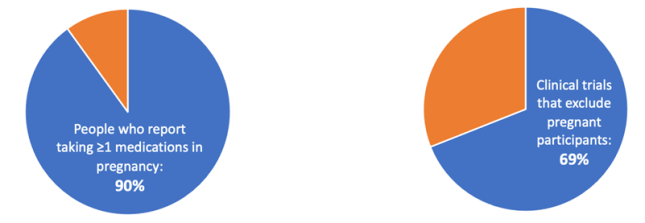-
Why We Must Include Pregnant People in Clinical Trials: The Case of the COVID-19 Vaccine
May 17, 2023 By Alyssa Kretz
Of the more than 4 million pregnant people in the United States annually, 90 percent report taking at least one medicine during pregnancy, and about 50 percent receive the influenza or tetanus toxoid/reduced diphtheria toxoid/acellular pertussis (Tdap) vaccines. Yet 69 percent of clinical trials conducted in the United States explicitly exclude enrollment of pregnant people.
The implications of this gap are clear. Every day, pregnant people are taking medications and vaccinations that have not been proven to be safe for them. They also may choose not to take essential and helpful medications because of a lack of safety information.
Clinical trials generally guide medical decision-making, but when it comes to pregnancy, medical practitioners often struggle to make recommendations due to a lack of evidence. On a practical level, this means that patients may discontinue essential medications during pregnancy for fear of its effect on the fetus, only to suffer severe medical consequences due to not taking their medication.
During pregnancy the body undergoes many substantial physiologic changes. These include an increase in heart rate, glomerular filtration rate, and sodium and water retention, reduced lung capacity, hormonal and mechanical changes to the alimentary tract, and changes to the endocrine and metabolic systems.
Given these changes in pharmacokinetics during pregnancy, including the absorption, metabolism, distribution, and excretion of substances, it is well within the realm of possibility that medications and vaccinations may have differential safety and efficacy profiles in pregnant vs. non-pregnant individuals. Pregnant people deserve to know how the medications they take may affect them and their babies.
So how can providers and patients weigh the costs and benefits of continuing vs. discontinuing a medication during pregnancy when there is such little research conducted with pregnant people? One essential step is for researchers to understand the safety of medication and vaccines in pregnancy by including pregnant people in clinical trials.

Why Have Pregnant People Been Excluded From Clinical Trials?
Bodies capable of reproducing, particularly those of Black, Indigenous, and Latinx folks and incarcerated individuals, have been weaponized throughout U.S. history. This history is long, ugly, and well-documented. This damaging legacy offers deeply-rooted historical reasons why pregnant people may not feel safe participating in clinical research trials.
But how exactly did pregnant people come to be considered “vulnerable subjects” in research?
In 1976, the U.S. National Commission for the Protection of Human Subjects of Biomedical and Behavioral Research published the Belmont Report, which described ethical guidelines for conducting human subjects research. In part, it cautioned against the inclusion of what were called “vulnerable subjects” in research.
Intended to signify populations that may be unable to consent to participation or subject to coercion, the designation of vulnerable groups has included children, incarcerated individuals, pregnant people, and people with mental disabilities. Institutional review boards require additional precautions when enrolling “vulnerable subjects” as study participants, and, as a result, many studies exclude these groups of people.
Yet the exclusion of pregnant people from clinical trials creates a dearth of medication safety evidence in this population. A well-known example is that of thalidomide, a drug that was marketed for the relief of nausea in early pregnancy in the 1950s and early 1960s. Because pregnant people were not included in the drug’s clinical trials, doctors did not learn of its negative effects on fetal development until it was too late. In just a few years, more than 10,000 babies whose mothers took thalidomide during pregnancy were born with severe limb defects or died shortly after birth.
The inclusion of pregnant people in clinical trials also provides vital information on the effects of medications and vaccinations in pregnancy, and allows clinicians to make evidence-based recommendations. In recent years there has been some progress made on this front. In 2016, the Congressional Task Force on Research Specific to Pregnant Women and Lactating Women (PRGLAC) was established, and today organizations such as the American College of Obstetricians and Gynecologists are advocating for legislation to advance medication research in pregnancy.
Unlike other “vulnerable groups,” such as incarcerated individuals, pregnant people are not uniquely susceptible to coercion. Far from losing their autonomy when they become pregnant, pregnant people are fully capable of making informed decisions regarding their health and participation in research—and should be able to do so.
What We Have Learned: Assessing Research on the COVID-19 Vaccine
When COVID-19 first came on the scene, scientists quickly sprang into action developing a vaccine. In just 12 months, the first COVID-19 vaccine was approved for emergency use authorization in the United States.
However, pregnant individuals were excluded from virtually all COVID-19 vaccine clinical trials, and a lack of safety information in this population led to a months-long delay in professional organizations recommending COVID-19 vaccination to pregnant individuals. Although pregnant people are at increased risk of severe disease and pregnancy complications due to COVID-19 infection, the absence of vaccine safety information in pregnancy and clear recommendations from professional organizations meant that many pregnant people remained unvaccinated.
As part of a research team at Johns Hopkins Bloomberg School of Public Health led by Rosemary Morgan, PhD, MSc, I have been part of a comprehensive effort to study reasons for COVID-19 vaccine hesitancy during pregnancy. Our literature review (to be published) of 44 articles from 39 countries revealed three main reasons for vaccine hesitancy in this population: fear of effects on the fetus; fear of effects on oneself; and a belief that the vaccine is too new or has not been studied enough in pregnancy.
Fear of negative effects on fetal development or pregnancy complications due to COVID-19 vaccination in pregnancy was a common sentiment. Many people said that the lack of data in pregnancy left them unsure what the effects on their baby might be, and thus unwilling to assume that risk. Some of them also expressed a fear of side effects or adverse reactions for themselves due to vaccination, or worried that side effects from the vaccine might affect their pregnancy or put their body under additional stress during this time.
A lack of good data was at the center of many fears. Some believed that the COVID-19 vaccine would cause infertility. Other people expressed fear that the vaccine was experimental or too new to understand its potential for long-term side effects, and they were particularly concerned about a lack of information on safety for pregnant people and their babies.
What we have discovered in this review is that COVID-19 vaccine hesitancy among pregnant people is largely not due to anti-vaccination sentiments or COVID-19 denial, but rather constitutes their attempt to do what is best for themselves and their babies with insufficient information. By including pregnant people in clinical trials, we can empower them with the information to make evidence-based decisions regarding their and their baby’s health. The inclusion of pregnant people in clinical trials, therefore, is not only ethical—but also essential.
Alyssa M. Kretz is a current Master of Public Health student at the Johns Hopkins Bloomberg School of Public Health and a rising fourth year medical student at the Johns Hopkins School of Medicine. She plans to pursue a medical residency program in obstetrics and gynecology. Kretz was inspired to write this piece in part by the unpublished policy brief “Cosponsor the Advancing Safe Medications for Moms and Babies Act” from the American College of Obstetricians and Gynecologists’ 2023 Congressional Leadership Conference.
Sources: The American College of Obstetricians and Gynecologists, American Journal of Obstetrics and Gynecology, Birth Defects Research, Cardiovascular Journal of Africa, Centers for Disease Control and Prevention, Congress.gov, European Heart Journal, The Guardian, International Journal of Endocrinology and Metabolism, Mayo Clinic, National Academies Press, National Archives and Records Administration, National Institutes of Health, National Institutes of Health Eunice Kennedy Shriver National Institute of Child Health and Human Development, National Kidney Foundation Inc., National Women’s Health Network, Race & Medicine, Science Museum, Seminars in Perinatology, Stanford Medicine, University of Michigan Institute for Healthcare Policy & Innovation, U.S. Department of Health and Human Services.
Photo Credit: Female doctor holding syringe in shoulder of pregnant female patient. Prostock-studio/Shutterstock.com.
 A Publication of the Stimson Center.
A Publication of the Stimson Center.







